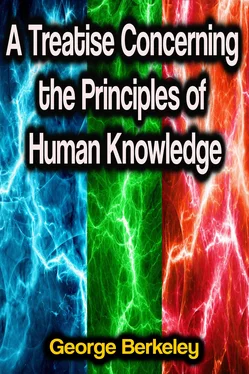12 By observing how ideas become general we may the better judge how words are made so. And here it is to be noted that I do not deny absolutely there are general ideas, but only that there are any abstract general ideas; for, in the passages we have quoted wherein there is mention of general ideas, it is always supposed that they are formed by abstraction, after the manner set forth in sections 8 and 9. Now, if we will annex a meaning to our words, and speak only of what we can conceive, I believe we shall acknowledge that an idea which, considered in itself, is particular, becomes general by being made to represent or stand for all other particular ideas of the same sort. To make this plain by an example, suppose a geometrician is demonstrating the method of cutting a line in two equal parts. He draws, for instance, a black line of an inch in length: this, which in itself is a particular line, is nevertheless with regard to its signification general, since, as it is there used, it represents all particular lines whatsoever; so that what is demonstrated of it is demonstrated of all lines, or, in other words, of a line in general. And, as that particular line becomes general by being made a sign, so the name "line," which taken absolutely is particular, by being a sign is made general.
And as the former owes its generality not to its being the sign of an abstract or general line, but of all particular right lines that may possibly exist, so the latter must be thought to derive its generality from the same cause, namely, the various particular lines which it indifferently denotes.
13 To give the reader a yet clearer view of the nature of abstract ideas, and the uses they are thought necessary to, I shall add one more passage out of the Essay on Human Understanding, (IV. vii. 9) which is as follows:
"Abstract ideas are not so obvious or easy to children or the yet unexercised mind as particular ones. If they seem so to grown men it is only because by constant and familiar use they are made so. For, when we nicely reflect upon them, we shall find that general ideas are fictions and contrivances of the mind, that carry difficulty with them, and do not so easily offer themselves as we are apt to imagine. For example, does it not require some pains and skill to form the general idea of a triangle (which is yet none of the most abstract, comprehensive, and difficult); for it must be neither oblique nor rectangle, neither equilateral, equicrural, nor scalenon, but all and none of these at once? In effect, it is something imperfect that cannot exist, an idea wherein some parts of several different and inconsistent ideas are put together. It is true the mind in this imperfect state has need of such ideas, and makes all the haste to them it can, for the conveniency of communication and enlargement of knowledge, to both which it is naturally very much inclined. But yet one has reason to suspect such ideas are marks of our imperfection. At least this is enough to show that the most abstract and general ideas are not those that the mind is first and most easily acquainted with, nor such as its earliest knowledge is conversant about."- If any man has the faculty of framing in his mind such an idea of a triangle as is here described, it is in vain to pretend to dispute him out of it, nor would I go about it. All I desire is that the reader would fully and certainly inform himself whether he has such an idea or no. And this, methinks, can be no hard task for anyone to perform. What more easy than for anyone to look a little into his own thoughts, and there try whether he has, or can attain to have, an idea that shall correspond with the description that is here given of the general idea of a triangle, which is "neither oblique nor rectangle, equilateral, equicrural nor scalenon, but all and none of these at once?"
14 Much is here said of the difficulty that abstract ideas carry with them, and the pains and skill requisite to the forming them. And it is on all hands agreed that there is need of great toil and labour of the mind, to emancipate our thoughts from particular objects, and raise them to those sublime speculations that are conversant about abstract ideas. From all which the natural consequence should seem to be, that so difficult a thing as the forming abstract ideas was not necessary for communication, which is so easy and familiar to all sorts of men. But, we are told, if they seem obvious and easy to grown men, it is only because by constant and familiar use they are made so. Now, I would fain know at what time it is men are employed in surmounting that difficulty, and furnishing themselves with those necessary helps for discourse. It cannot be when they are grown up, for then it seems they are not conscious of any such painstaking; it remains therefore to be the business of their childhood. And surely the great and multiplied labour of framing abstract notions will be found a hard task for that tender age. Is it not a hard thing to imagine that a couple of children cannot prate together of their sugar-plums and rattles and the rest of their little trinkets, till they have first tacked together numberless inconsistencies, and so framed in their minds abstract general ideas, and annexed them to every common name they make use of?
15 Nor do I think them a whit more needful for the enlargement of knowledge than for communication. It is, I know, a point much insisted on, that all knowledge and demonstration are about universal notions, to which I fully agree: but then it doth not appear to me that those notions are formed by abstraction in the manner premised- universality, so far as I can comprehend, not consisting in the absolute, positive nature or conception of anything, but in the relation it bears to the particulars signified or represented by it; by virtue whereof it is that things, names, or notions, being in their own nature particular, are rendered universal. Thus, when I demonstrate any proposition concerning triangles, it is to be supposed that I have in view the universal idea of a triangle; which ought not to be understood as if I could frame an idea of a triangle which was neither equilateral, nor scalenon, nor equicrural; but only that the particular triangle I consider, whether of this or that sort it matters not, doth equally stand for and represent all rectilinear triangles whatsoever, and is in that sense universal. All which seems very plain and not to include any difficulty in it.
16 But here it will be demanded, how we can know any proposition to be true of all particular triangles, except we have first seen it demonstrated of the abstract idea of a triangle which equally agrees to all? For, because a property may be demonstrated to agree to some one particular triangle, it will not thence follow that it equally belongs to any other triangle, which in all respects is not the same with it. For example, having demonstrated that the three angles of an isosceles rectangular triangle are equal to two right ones, I cannot therefore conclude this affection agrees to all other triangles which have neither a right angle nor two equal sides. It seems therefore that, to be certain this proposition is universally true, we must either make a particular demonstration for every particular triangle, which is impossible, or once for all demonstrate it of the abstract idea of a triangle, in which all the particulars do indifferently partake and by which they are all equally represented. To which I answer, that, though the idea I have in view whilst I make the demonstration be, for instance, that of an isosceles rectangular triangle whose sides are of a determinate length, I may nevertheless be certain it extends to all other rectilinear triangles, of what sort or bigness soever. And that because neither the right angle, nor the equality, nor determinate length of the sides are at all concerned in the demonstration. It is true the diagram I have in view includes all these particulars, but then there is not the least mention made of them in the proof of the proposition. It is not said the three angles are equal to two right ones, because one of them is a right angle, or because the sides comprehending it are of the same length. Which sufficiently shows that the right angle might have been oblique, and the sides unequal, and for all that the demonstration have held good. And for this reason it is that I conclude that to be true of any obliquangular or scalenon which I had demonstrated of a particular rightangled equicrural triangle, and not because I demonstrated the proposition of the abstract idea of a triangle And here it must be acknowledged that a man may consider a figure merely as triangular, without attending to the particular qualities of the angles, or relations of the sides. So far he may abstract; but this will never prove that he can frame an abstract, general, inconsistent idea of a triangle. In like manner we may consider Peter so far forth as man, or so far forth as animal without framing the fore-mentioned abstract idea, either of man or of animal, inasmuch as all that is perceived is not considered.
Читать дальше












